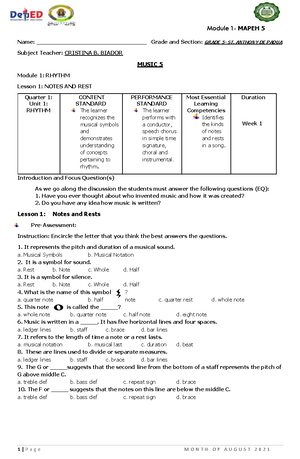- Information
- AI Chat
Was this document helpful?
Ethics- Reviewer - C SNC
Course: Rhythmic Activities (PE002)
31 Documents
Students shared 31 documents in this course
University: University of Caloocan City
Was this document helpful?

ETHICS
JAN20
THE ETHICAL DIMENSION OF HUMAN EXISTENCE
Ethics- is about determining the grounds for the values with particular and special significance to
human life.
Morality- use to refer to specific beliefs or attitudes that people have or to describe acts that people
perform.
(Aesthetics, Etiquette, and Technique are not considered to be ethical)
Aesthetics- is derived from the Greek word aesthesis (sense or feeling) and refers to the judgment of
personal approval or disapproval that we make about what we see, hear, smell, or taste.
- Taste for beauty
Etiquette- concerned with right and wrong actions.
- Norms in the society
Technique –derive from the Greek word techne and English word technique and technical which are
often used to refer to a proper way of doing things.
- It’s either not punishable or can be punishable
Descriptive – reports how people, particularly groups, make their moral valuations without making any
judgment either for or against these valuations.
Normative- prescribe what we ought to maintain as out standards or for moral valuation.
Positive law (Person made law) - refers to the different rules and regulations that are posited or put
forward by an authority figure that require compliance.
Divine command theory- region telling us
-Require us to identify the entire sense of right and wrong with what religion dictates.
Cultural relativism- what is ethically acceptable or unacceptable is relative to, or that is to say,
dependent on one’s culture.
(SENSE OF THE SELF: Subjectivism, Psychological egoism, Ethical egoism)
Subjectivism- recognition that the individual thinking person is at the heart of all moral valuations.
Psychological egoism- good image to other people; self-interest
-Is the theory that describes the underlying dynamic behind all human actions
Ethical egoism- outside benefit
-Prescribes that we should make our own ends, our own interest, as the single overriding them.
Moral Dilemma- moral issues involve (life and death)
-Mercy killing (reasoning)
-------------------------------------------------------------------
Students also viewed
- (f) Reviewer- Quizf - C NCXN
- DAY 2 WEEK 4 Lesson 4 Equipment OF Basketball COPY OF Students
- DAY 2 WEEK 5 6 Fundamental Skills of Basketball Copy of Students
- UNIT 2 Lesson 2 4
- DAY 3 WEEK 7 Simplified Rules AND Regulation OF Basketball COPY OF Students
- Lesson 8 DAY 3 WEEK 8 Referees HAND Signal COPY OF Students







